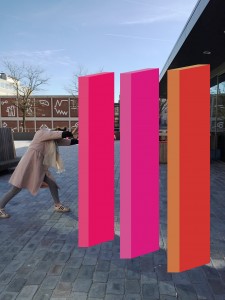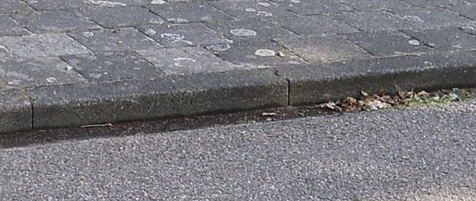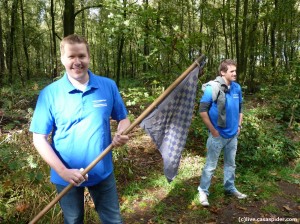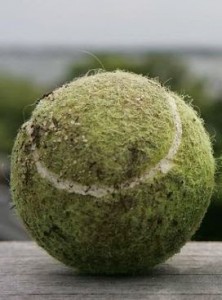Rock, Paper, Scissors
During our annual family Christmas morning walk in the woods, me and my two sisters introduced “Rock, Paper, Scissors” to our father. He never heard of it, which surprised us. When making choices (for example “who has to do the dishes?”, “Who has to let the dog out?” and so on), my sisters and I always use this little game.
Our father quickly picked up the rules of the game, even though he needed a few minutes to comprehend the fact that paper beats rock. He assumed that a rock could easily destroy a paper sheet, which is a quite an understandable assumption. We just told him to go with the established rules and not think about it too much. After he got the hang of it, he implemented the game in every possible chance he got. Some of the questions were “Will Vera ever graduate? If I win it’s a yes, if you win it’s a no.”
“Is this tree green? If I win it’s a yes, if you win it’s a no.”
“Why am I not a millionaire? If you win it’s because I never studied, If I win it’s because I’ll be one soon.”
We had a lot of fun during our walk, because our whole conversation was based on these weird questions, most of them not even answerable by “Rock, Paper, Scissors”. So even though the game used to be just a method for solving ‘problems’, it now was a really fun (and ridiculous) game.
“I really want to push these scooters, just like Domino Day.” – Anne de Bode
Ever played domino day, with bicycles, or scooters? Let me rephrase, ever wanted to play domino day with bicycles or scooters?
WHY IT IS FUN
It’s something that you would never do in real life, because it’s very bad. But in your mind you already gave that perfect line of bicycles a knock. This version of the domino day is played with large objects, maybe it’s a good idea to replace the bicycles and scooters with large blocks. The original game includes small blocks, so sometimes when things do get bigger, it’s more interesting. It makes you feel small in the perception of the game.. So more exciting!

Settlers of Catan
This is one of my favorite board games of all time and one of those games everyone has played at least once in their life.
In the Settlers of Catan each player takes the role of new settlers on an uninhabited island. The players have to create villages, cities and roads to spread their settlers over the island, they do this by harvesting minerals and other materials like wood, wool, wheat and clay. You earn points by building stuff and the player who first reaches 10 points, wins.

The reason that I like this game so much is because of the social aspect. You think of a strategy and then you have to trade with other players to obtain the right materials. Quickly you’ll see an economy arise where some materials are more valuable than others. Moreover this economy can change all the time because of droughts or a sudden rise of materials getting harvested.
We always played this game with a big focus on the social aspect, alliances got made and broken and players would boycott each other all the time. Also the game is different every time because you can make your own island.
Hide and Seek
My favorite game when I was a kid was definitely hide and seek. My parents had a large garden with lots of trees and bushes, which was great for playing this game.
We played a version of hide and seek with a ball. At the beginning of the game, one player would kick the ball and the seeker would run after to collect it while the rest would go and hide. Once the seeker had put the ball back on it’s starting point, he could begin searching. Whenever the seeker found someone he would have to run back to the ball and shout the hider’s name and his hiding spot. However if the hiders could come close enough to the ball and touch it, they would be safe from being the seeker next round. The last hider left could also kick the ball and then the entire game would start again, with the same seeker having to collect the ball. At the end of the game, when everybody was found or safe, the first hider that got found had to be the seeker.

The most fun part about this game is of course the thrill of hiding and someone searching and hunting for you. The way we played it also made sure that you were constantly on the move, which made the game more dynamic. Nothing is more exciting than being the last person to outsmart the seeker and to kick away the ball. Also, even though nobody wanted to be the seeker, this role also had its moments. The gratification of finding somebody was always big and the thrill of running back to the ball was also an exciting moment.
The Legend of Zelda: A Link to the Past
This week I decided to play an old videogame called The Legend of Zelda: A Link to the Past. The title is considered a classic, and although I’ve played other games in the serie, I had never played this one. In the game you are the hero called Link who has to save princess Zelda from the evil Ganon. It is very much an adventure game where you have to fight badguys, solve puzzles, explore dungeons and strange lands and you get stronger by acquiring new items and weapons. The most fun thing about the Zelda games, I think, is the exploration and puzzle solving. Especially the dungeons are very intricately made with some mind-bending puzzles that seem hard at first, but always have a logical solution. I like the way the game makes me think about the items and the abilities I have and how I can combine them in new ways. A new item can really change the way you look at the environment. For example when you get the bombs, suddenly you see all these weak walls where you can use them, that you might not even saw before. The way you continually learn new things is brilliant and you always have a feel of progression. I think we can learn from the design in this game, especially educational-wise.

“Curb-brim-balancing”
This is a little game that everybody has done in their lives called curb-brim-balancing. It goes at follows, you walk on the little brim of the curb and you can’t fall of on the road or the rest of the curb. Especially high curbs are great for this. The game is to test your balance and to see if you can stay on for a very long distance. Other fun places to do this is on high benches, or on other small things you can walk on. This way you make everyday objects into challenging and daring balancing acts!

For my first weekly Gameplay Insights, I interviewed my twelve year old sister Bobbie.
I asked her what game she currently plays a lot, and why she thinks it’s fun.
She told me she loves playing Crossy Road, because she thinks it looks “oldschool”. When being asked why the game looks oldschool, she referred to the 8-bit visual style of the game. She likes games that have a vintage feeling to it, and she likes the fact that nowadays, the new (80’s/90’s inspired) games can be played on modern devices.
Crossy Road Gameplay Launch
She told me you can only play this game individually, and that she plays it when she’s bored or when she doesn’t have anything better to do. I asked her if playing this game makes her happy, and she told me it does. On the contrary, she told me the game can be hard and it frustrates her when she’s game over, which results in quitting. She won’t be patient enough to continue playing. She also told me it isn’t hard to get better at this game and getting further gives her a rewarding feeling.
It usually takes five to ten minutes until she stops playing, and she plays Crossy Road about two to three times a day.
Date: 12-02-15
Game: “Levend” Stratego
Levend Statego is a real life form of the tabletop game Stratego.
Why is Stratego Fun?
Stratego is a game where you have to remember a lot of things during the game and use that information to outthink your opponent. The fun part is to win of the other player, by making smart moves and using tactics to trick that opponent. The tactical part makes the game fun.
What makes the Real life version different than the normal version?
The main difference between the two, is the possibility to play the game with more than 2 people at the same time. Another difference is that the game is much quicker and it has become a physical game instead of an board game.
Why is Levend Stratego Fun?
The same tactical rules from the normal Stratego still apply to the real life version. Above that, the real life version combines the Stratego rules with the rules of tag. It becomes a tagging game, when you know that someone has a higher card than you.
It’s fun to do it with a lot of people, because you have to work in teams. You share the tactical parts from the original game, but with multiple players. You can also back-up another player when you know that the tagger has a certain card. The tactical part of Stratego is still the main reason that Levend Stratego is fun, but it gets extended by the teamwork.

Game: ‘Habba’ (or: ’Hibby’)
The game ‘Habba’ was played in the short break of 15 minutes in primary school amongst the
boys. Only one tennisball was required to have a real fun time during this short break.
When someone threw the tennisball on someone else, the player that got hit was ‘it’. He now had to pick up the tennisball and hit someone else with it. (In a way it sort of looks like ‘Tag, You’re it)
The rules:
- You weren’t allowed to hit someone on the head. When this occurred the player who threw the ball was still ‘it’.
- When the tennisball was ‘free’, the other players were allowed to (and used to) spit on the ball. That is why the person who was ‘it’ had to pick up the ball quickly to prevent the others from doing this. The ball was free when it bounced off somebody that got hit by the ball or when the person that threw the ball missed all the participants of the game.
- The game ended when the bell rang.
- The person who was ‘it’ after the bell rang was sleeping with ‘Habba’ that night. This was considered gross, as Habba was described amongst the boys as a disease with rare disorders such as: Writing backwards the next day or getting itchy at night. You couldn’t get rid of Habba the rest of the day when you had lost the game.
- You weren’t allowed to cross the boundaries that were agreed up on.
- You could try to hide the tennisball so that nobody could see it. Most of the time this tactic wasn’t very useful because every played knew who had the ball and communicated this with the rest of the group.
- You could try to get your friends to say that someone else had the ball
What made the game fun:
- Everybody was very fanatic and tried to get as far as possible from the person that had the tennisball.
- Everybody communicated over who was ‘it’.
- Nevertheless, you had to pay attention of who was it, because otherwise it was possible you were going to be deceived by the other players.
- Nobody wanted to get hit by the tennisball (or in time: Spitball).
- It was fun to see others get hit by the gross tennisball.
- You had a certain amount of ear that you would get hit.
- An unwritten rule was that you would not throw the tennisball on your friends, that’s why in this game it was beneficial when you had many friends.
- Also you and your friends could help each other by communicating false information.By all costs you didn’t want to be it when the bell rang, as you would be nagged the rest of the day because you would ‘sleep with Habba’ and could get the ‘horrific’ disorders












